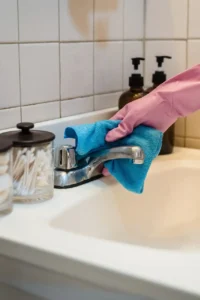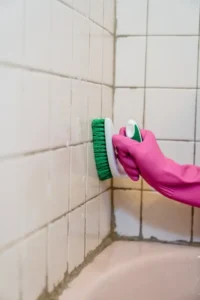Illness from Mold and Mycotoxins

Mold is a microscopic fungus that thrives in moist environments. It lives on walls, ceilings, floors, clothing, upholstery and fabrics, leather, carpets, painted surfaces, paper, and cardboard. It cannot live on inorganic materials like glass, metal, or concrete but can survive in the dirt and dust accumulating on these surfaces. The World Health Organization reports that anywhere from 20% to 50% of homes across the globe have some severe mold problem, commonly called Sick Building Syndrome.
The most apparent health issues from mold are respiratory, asthma, wheezing and coughing, sinus problems, bronchitis, and watery eyes. However, in some cases, people may experience long-term chronic health issues that affect much more than the respiratory system. Chronic mold exposure can, in some cases, cause acute hypersensitivity and dysregulation of the immune system, called dampness and mold hypersensitivity syndrome (DMHS). This can lead to cognitive issues like brain fog, fatigue, pain, inflammation, infections, and mast cell diseases.
Mast Cells, Mycotoxins, and Mold Exposure
Mast cells are necessary immune cells critical to the body’s innate and adaptive immunity, allergic responses, regulating autoimmunity, and combatting cancer and inflammation. Mast cells are white blood cells found in the skin, the digestive, respiratory, and urinary tracts, reproductive organs, and blood following an infection. When you have an allergic reaction, mast cells trigger a typical allergic response; however, sometimes mold exposure can cause the continuous release of an overabundance of mast cells, which can cause mast cell activation syndrome (MCAS). Symptoms include fatigue, painful and itchy rashes, anxiety, headaches, and autoimmune conditions. Though the exact mechanism of this over-reactive immune response is not entirely understood,the overabundance of mast cells is believed to occur from mycotoxins, which are poisonous substances found in active live mold spores. When mycotoxins are released from mold spores into the body, they jump-start mast cells to secrete pro-inflammatory cytokines and chemokines. In addition to the MCAS symptoms, the mycotoxins can also cause impaired brain function, including short-term memory, intermittent disorientation, disturbed balance and coordination, inability to multi-task, and impairment of attention span and reaction time.

Symptoms of Mold Exposure
The first step is getting rid of the mold. We think of mold as black, but it can be pink, purple, green, yellow, brown, and white. Or it may not be visible at all. The spore color, how much you see, has nothing to do with the toxicity of the mold. Mold spores grow phenomenally fast in theright conditions, so it is essential to pay close attention to damp and wet conditions in your home. While you may be tempted to get out the bleach and start scrubbing, we recommend that you call experts to find the source of the mold and help you safely clean up mold in your home. Mold professionals have safe alternatives to bleach cleaners and know how to safely remove alltraces of mold from your home or office. Mold can hide in air conditioning and heating systems,walls, and other places that are not easily visible. See hidden sources of mold
Integrative Treatment of Mold
Integrative doctors work on addressing any underlying health issues contributing to mold toxicity. This can include managing chronic infections, supporting the immune system, and reducing inflammation in the body. By taking a comprehensive approach, integrative doctors aim to treat mold toxicity and improve overall health and well-being.This type of comprehensive care requires seeing a doctor with experience in treating mold. Integrative physicians use precise testing methods to measure mold exposure and how mycotoxins may compromise the body. Our physicians conduct a thorough medical history and ask about environmental exposures, including the source of water damage and mold exposure. Laboratory testing includes urine mycotoxin testing, visual and cognitive testing, body scanning, and biochemical and inflammatory marker diagnostic tools. The type of mycotoxin exposure will establish the treatment protocols to rid the body of the source of infection. Our physicians will establish an individual treatment plan using a combination of various integrative therapies to restore the body and help you feel better. If you believe you have chronic health issues related to mold exposure, contact Restoration Healthcare to learn more about our integrative approach to mold and toxin exposure.
Exposure to mold and mycotoxins can result in various health issues, including respiratory problems, allergies, headaches, and fatigue. In severe cases, it can lead to neurological symptoms and cancer. If you suspect mold-related illness.Contact us at Restoration Healthcare at (949) 535-2322 for specialized care.


